

| Interstage Shunsaku Data Manager Operator's Guide - Microsoft(R) Windows(R) 2000/ Microsoft(R) Windows Server(TM) 2003 - - UNIX - |
Contents
Index
 
|
| Chapter 1 Overview |
Shunsaku boasts the following features:
These features are described below.
 Strong Search Functions and High-speed Searches
Strong Search Functions and High-speed SearchesShunsaku makes it easy to handle data that has a complicated structure. This includes data where:
Most types of items can be processed by one search request. Shunsaku can also process a variety of conditions, including complicated conditions involving character strings, numeric data, and word searches targeting English words, in one search request.
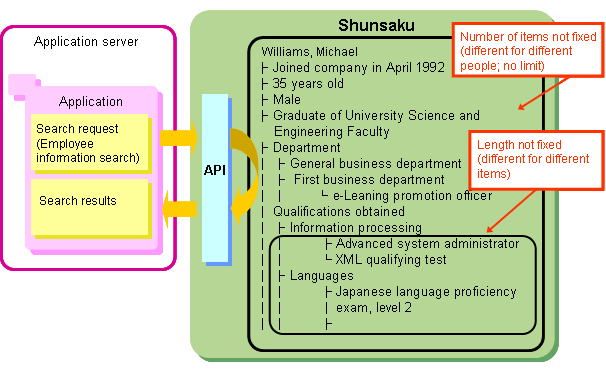
In addition, Shunsaku enables high-speed searches regardless of the volume of data, and enables cross-section searches of data in multiple systems. High-volume traffic can be processed at high speeds because multiple search requests are processed as a group, the search results then split, and returned to the applications.
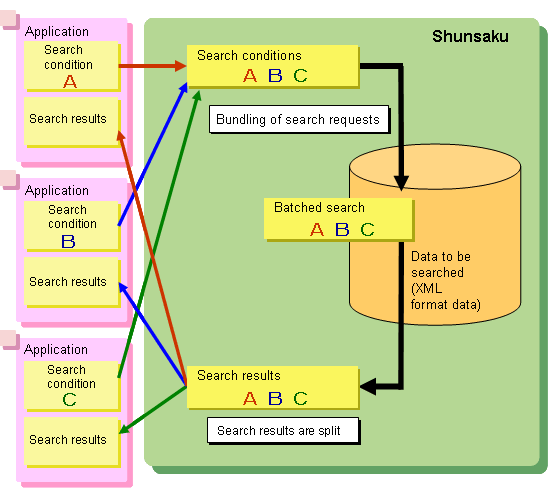
 High Adaptability to a Real Time Processing
High Adaptability to a Real Time ProcessingWhile the needs of real time information usage are increasing, Shunsaku provides high-speed searches by accessing directly to the data specified by a key.
Shunsaku also provides the real time monitoring to the data on a system, collects information, detects and solves problems on business processes immediately.
 Highly Flexible System Structures
Highly Flexible System StructuresSince Shunsaku has no indexes, new data definitions or tuning are not required if new data items are added or search methods are modified as a result of business expansion or changing needs. Changes in business can be managed simply by adding applications. In addition, if the quantity of data becomes greater than was expected when a system was constructed, the simple addition of search engines can instantly handle the increase.
When Shunsaku is running on a single server, increases in the amount of data that is handled can result in inadequate performance due to the limitations of the server hardware. In such cases, multiple servers can be relocated to separate servers to distribute the load evenly on each server and improve operating efficiency.
As the scale of a business expands, performance may deteriorate due to an increase in the number of jobs that must be processed, and different jobs may be required to perform different types of operations. In such case, Shunsaku can group data and improve the performance of individual jobs and provide flexibility to the operation design.
 High-availability Operation with Load Redistribution
High-availability Operation with Load RedistributionShunsaku has the following features to improve the reliability of data maintenance and enable high-availability operation.
 Backup and Recovery
Backup and RecoverySystems that are required to provide a higher level of reliability must be able to reliably restore data in the event of an unexpected system failure or disk malfunction.
Shunsaku is equipped with backup and recovery functions that enable it to reliably restore data right up to the state that existed immediately prior to the problem.
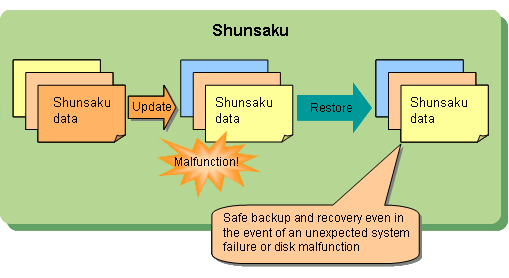
 HA(High Availability)
HA(High Availability)Shunsaku features a High Availability (HA) function that provides systems with a high level of availability.
If an active server malfunctions, the data that was being processed by that server is automatically transferred to another server that is functioning normally, allowing operations to continue uninterrupted.
During the operation, if an active server malfunctions, the data in a malfunctioning server can be transferred to the standby server so that the malfunction does not have a detrimental effect on performance. This is referred to as a failover function.
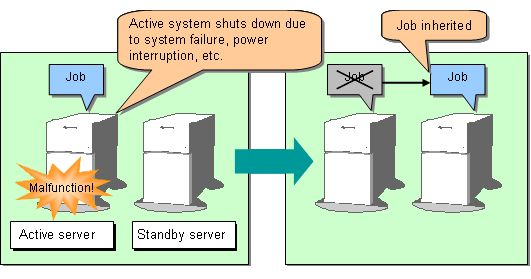
 Transaction
TransactionTransaction function ensures the data integrity without reading the contradict data and waiting for the response even when searches generate simultaneous updates.
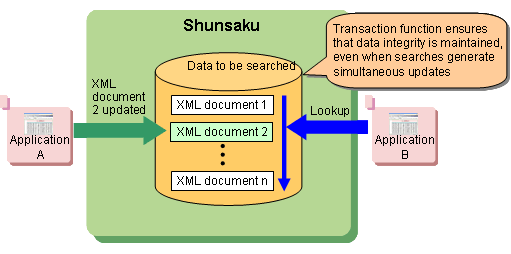
 Applicable to Major Application Development Environment
Applicable to Major Application Development EnvironmentJava, C, and .NET (which is the major development environment in Windows) can be used for the application development. Various languages for .NET can be used and applied to the environment where the Web application is running by using ASP.NET.
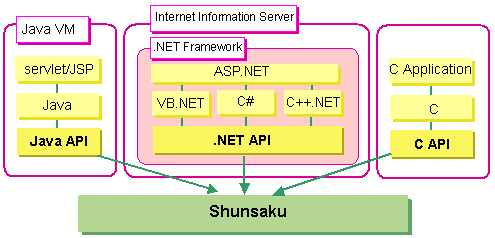
Contents
Index
 
|